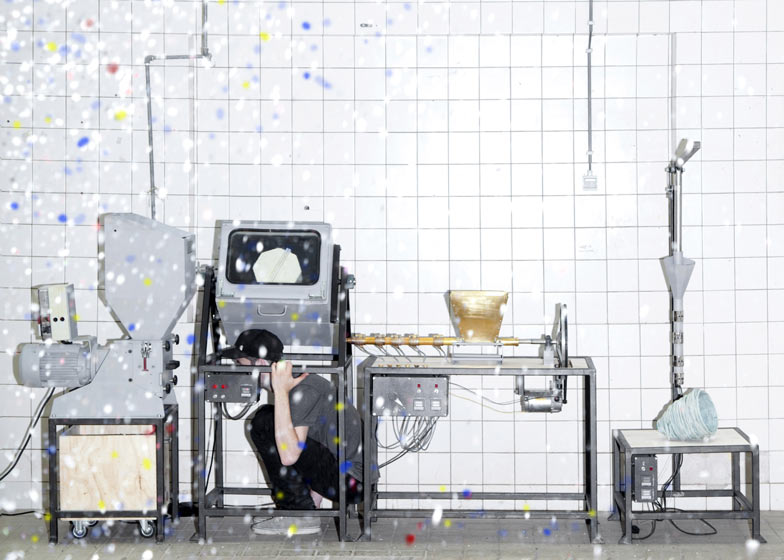Dutch Design Week 2013: Design Academy Eindhoven graduate Dave Hakkens has made his own machines for recycling plastic to make new products locally and plans to share the designs so others around the world can do the same.
The Precious Plastic machines by Dave Hakkens include a plastic shredder, extruder, injection moulder and rotation moulder, which are all based on industrial machines but modified to be less complex and more flexible.
"Of all the plastic thrown away, I've heard that we recycle just ten percent and I wondered why we recycle so little," Hakkens told Dezeen at the Design Academy Eindhoven graduation show opening on Saturday.
One of the issues turned out to be a lack of demand for recycled material from factories, so he visited a range of firms making plastic products to ask why they weren't using recycled plastic. He found that difficulties with sorting plastics for recycling make the resultant material less reliable than brand new plastic.
"I went to all these companies and I realised that the machines they use to build plastic products are really expensive, very precise and efficient, and [the manufacturers] don't want to use recycled plastic because it's not as pure so it could damage the machinery or slow down production," he explained.
"I wanted to make my own tools so that I could use recycled plastic locally," Hakkens continued. First he modified a shredder and collected unwanted plastic from his friends, family and neighbours. This allowed him to grind empty bottles and containers into small plastic chips in a mixture of colours.
He then built three machines for melting the plastic and manufacturing new products with it, using a combination of new custom-made components and reclaimed parts like an old oven that he found at a scrapyard.
Having perfected the systems so they could handle inconsistencies in the recycled plastic, he designed a small range of products to make and sell.
At the academy show there's an injection-moulded spinning top, a lamp made by extruding a ribbon of plastic and wrapping it round a mould, and a rotation-moulded waste paper bin, but Hakkens stresses that the processes could be adapted to make a wide variety of different products.
"In the end you have this set of machines that can start this local recycling and production centre," he said, explaining that while mass-manufacturers are put off recycled plastic as a material because they need optimum efficiency and accuracy, a local craftsperson making batches of products could afford to work more slowly and make allowances for material inconsistencies.
In addition to setting up his own workshop in Eindhoven, Hakkens intends to publish the blueprints online so that people around the world can create their own local recycling and manufacturing centres, and adapt his designs for their own production needs.
"The idea is that you can make whatever moulds you want for it - so I made this, but I prefer that everybody can just use them and make whatever they want and start setting up their production," he said. "People can just make [the machines] on the other side of the world, and maybe send some feedback and say 'maybe you can do this better.'"
He also suggested that local residents who collect plastic waste and bring it to the workshop could be paid a small fee according to the weight of raw material they donate, and predicted that his system could be put to use making filament for 3D printers.
Hakkens is also showing a mobile phone made of detachable blocks at the graduation show as part of Dutch Design Week, which continues until 27 October.

